Twin Dragons (1992)
Directed by: Ringo Lam, Tsui Hark
Written by: Barry Wong, Tsui Hark, Tung Cho 'Joe' Cheung, Yik Wong
Starring: Jackie Chan, Maggie Cheung, Nina Li Chi, Teddy Robin Kwan
AKA SEONG LUNG WAI
HONG KONG
AVAILABLE ON: BLU-RAY [88 Films release], DVD and DIGITAL
RUNNING TIME: 104 mins, 89 mins [US theatrical release]
REVIEWED BY: Dr Lenera
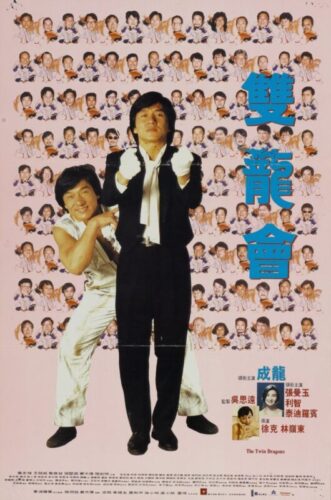
In 1965, Mrs Ma gives birth to identical twins. A criminal named Crazy Kung being held as a prisoner in the same hospital escapes and tries to take one of the twins hostage. The child is lost during the confusion and Mr and Mrs Ma return to New York with just one child, while the other twin is eventually found by Tsui, an alcoholic woman. Twenty-six years later, Ma Yau is a famous conductor and pianist, unaware that his twin brother Ma Wan is a mechanic/race car driver/bodyguard with martial arts expertise in Hong Kong going by the name Bok Min. He’s also in trouble with local mobsters. When John travels to Hong Kong to give a concert, the twins are about to get caught up in each other’s business….
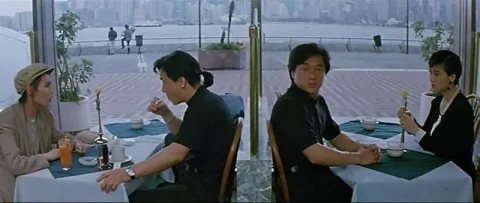
Jackie Chan tends to be far mote critical of films that he didn’t direct than he does of films that he did. Considering that he was something of a control freak back in his glory days, this is perhaps not surprising, but sometimes his complaints don’t really hold water. His main issue with Twin Dragons was supposedly the special effects depicting two Chans together. He said that he insisted Tsui Hark direct due to his experience with special effects, but that the end result caused him to not want to make any more films with special effects until he moved to Hollywood. However, considering that they were done without computers and with quite a low budget, many of them are really quite good, and this is even when seen in HD on the stonking Blu-ray from 88 Films, while the really bad ones aren’t that numerous. Therefore it’s hard to see what Chan’s problem was, and one can just surmise that he just wished he’d directed the film, even though he was already moving away from directing when he made it, largely because he’d gone way over budget with Miracles: The Canton Godfather and Armour Of God 2: Operation Condor. Twin Dragons isn’t generally regarded as one of Jackie Chan best films, but I always used to get a hell of a lot of enjoyment out of it, and viewing it after some time in this new release produced the same response. The martial arts is largely relegated to the beginning and the end, but there’s action of other kinds in-between, and anyway this is first and foremost a comedy, and a comedy which makes the very most of its premise, with all sorts of fun with the ideas of mistaken identity and one person who’s often [though not always, it does sort of come and go] feeling what another is experiencing. Chan’s twin performances are good as well; in fact I’d say that Twin Dragons has some of his very best comedic acting, with Chan even restraining from doing heavy mugging.
This film was an elaborate fundraiser for the Hong Kong Film Director’s Guild, with the profits going towards their new building. This is why lots of directors and performers including Kirk Wong, Wong Jing and Ng See-yuen appeared in cameos and for free. Helming the actual production were Ringo Lam and Tsui Hark, who worked on separate scenes individually, Lam doing most of the action. A few scenes were directed by Tung Wei. Box office was good. The Taiwanese and Japanese versions contained more conversation between the twins in one scene; the former also added extra dialogue in four scenes while the latter finished with a narrator over shots of the Police Story films, implying that the third episode was Coming Soon. The International Version has no edits, but the 1999 American and British theatrical release lost 15 minutes of footage, the bulk of it being a bizarre hospital scene I describe later and Barbara imagining she’s a singer performing to a huge crowd, but with two dialogue scenes removed too, plus a new music score by Michael Wandmacher. It was weird for some of us UKers seeing this altered edit after many years of familiarity with a longer and differently dubbed and scored version. Upon the North American release, Canada-based kickboxing entrepreneurs Martin McNamara and Michael McNamara sued Miramax Film Corporation, Alliance Atlantis Communications, and Front Row Entertainment, Inc. for their promotion of this movie. Claiming copyright and trademark infringement, the McNamaras, who hold the copyright on the term “Twin Dragons” as the name of their martial arts academy, asserted that it “tarnished” their images as fighting promoters, and asked for a total of thirty-seven million dollars in damages. They lost. And the new Hong Kong Film Director’s Guild building was never built.
Curtains open to reveal a shot of a hospital in the black and white prologue which sets things up very nicely with some intense action along with a few laughs. We’re introduced to two babies in a cot, who are of course Yau and Wan; their parents pick them up and father [David Chiang in a rare modern role] says “they, look the same, it’ll be difficult to separate them”, to which mother replies “knock on wood and rephrase that, don’t talk about separating them”. Well, there’s nothing like foreshadowing something right before it actually happens! Cut to the villainous Kung being wheeled down a hospital corridor, then Kung grabbing a gun and breaking free. A brief shootout ensures, then mum and Kung fighting over one of the babies. Kung, carrying the child, crashes through a window to fall on top of a van, a pursuing cop swings down and ends up hanging on to the van as it drives. The van crashes and the baby is knocked out of its cot on to the ground; a drunken woman, who may or may not be part of a small group of prostitutes, finds it. A short montage shows Wan as a street kid who gets involved in fights, then a similarly aged Yau playing the piano, before showing them both as adults, Wan’s fingers oddly moving as he fixes a car while, all the way over in New York, Yau plays the piano at a concert. This is all nice, succinct storytelling, and takes us to our first, very brief, bit of fighting as Wan accidentally touches a girl’s bottom and is attacked by her boyfriend and a few others in an outdoor restaurant, with Chan hanging onto some lights and throwing fruit and some chilies which Yau over on New York smells. We learn that the poor woman who brought him up, who he ‘s always thought to be his mum, died some time ago, but we never learn why these twins sense so much of each other’s doings – though why should we?
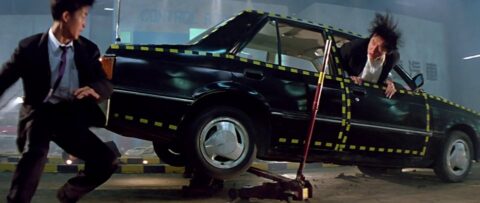
In a nightclub, “Barbara” [even in the version with English subtitles] is singing and gangster Boss Wing interrupts and joins in, to her discomfort. Wan also fancies her but so does his mate Tarzan[!], so it’s Tarzan who does much of the verbal objecting. Wan pulls a gun when things get more tense, but it’s a fake, leading to the first full on fight. As is sometimes the case, a Chan character is shown to lose a fight, and Wau and Tarzan wind up tied to chairs and being threatened with a baseball. Wing will let them go if they find $300 000; they promise to do so but of course intend to flee with said money, which they get by highly dodgy means, instead. “Look at the colour of her hair, she’ll make you a cuckold”, says Wan to put Tarzan off Barbara so he can have her himself. Meanwhile Yau has arrived in Hong Kong and the two twins pass each other without noticing, the whole buildup to the twins seeing each other being nicely done; soon after they sit back to back in a restaurant. Yau is going into his hotel where Uncle Tang, whom we’re not sure is the hotel’s manager or Yau’s, tries to set him up with his daughter Tong Sum. “She’s your childhood playmate she used to play the flute with you” says Tang to his daughter, which could sound rather off if you were in a particular frame of mind. Anyway, the rather shy-with-women Yau does take a shine to Tong Sum, but she has a preference for muscly guys, in particular a certain person named Stallone, whom he calls Rocky [I’m not joking, or at least with regard to the subtitled version]. This idiot sometimes shows up to behave in an annoying and even destructive manner, but it’s hard to believe that Tong Sum actually likes this guy; in fact we aren’t shown a single scene which shows this. Never mind, Yau and Tarzan soon have to flee Wing and his mob. because they haven’t paid Wing back. And then the twins unknowingly cross paths again. Rocky attacks the wrong twin, which leads to Yau being accidentally enlisted to participate as an escape driver in the liberation of none other than Kung, and as for Wan, what does he have to do? Conduct Yau’s concert!
The first proper fight set piece is when Wan [and Tarzan, though of course he can’t really fight] have to face off against Wing and his lot in the nightclub. It’s pretty impressive as Chan does his trademark flips off walls and over furniture while using everything he can get his hands on, including the microphone, the speakers and sound itself, to fight off a whole load of bad guys. Yau eventually goes outside where he swings on a street light and battles Alfred Cheung as Wing, before going back inside and having loads of suited hoods jump on him so he’s beaten. I’ve always liked the fact that Chan’s characters sometimes lose fights. The action is a bit harder than the usual Chan fight was becoming, though still with bits of comedy. That’s about it fight-wise for ages, though there’s a pretty good boat chase which evokes old school 007 even without the music which accompanies it, a cheeky, cheesy variation of the James Bond Theme [which American cinemagoers weren’t able to enjoy due to it being replaced]. It climaxes with Chan jumping on to another boat to quickly best some villains and boats driving on land and crashing into cars, with Wing being bashed back and forth between the fronts of two vehicles for great comic effect, while all this time Yau has been feeling some of what’s going on, bouncing around in a restaurant soaking himself and other diners. Not long after that, we have Rocky trying to beat up the wrong twin in a shopping mall. All Chan really does is dodge, but it still showcases his dexterity and we have brought back to us memories of Police Story, which looks like may have been intended. It’s some time between now and the final act – but what a final act it is! Chan fights with great intensity and we have fun with both twins fighting bad guys in different rooms and this being interchangeable, but how about Chan leaping into a car through a window, rolling under a car as the jack is let down, then running over [yes, running over] a car that’s coming off a ramp? It’s genuinely awe-inspiring. Seeing the Chan who can’t fight actually finally doing so [sort of] is great too.
The subsequent mix-ups are generally engaging if not always hilarious and sometimes slightly more sexual than usual for a Chan film; smutty bedroom farce turned up in a few earlier Chans, but here not one but both of the characters he plays end up not just having sex but having sex with the wrong women, and very early on in the relationships too. The contrast between a romantic kiss as soppy music plays and two people about to get their end away is nicely done, and editor Marco Mac really deserves a bow here for his successful efforts throughout in cross-cutting so many sequences and making them work and flow. The comedic highpoint must be when Wan has to conduct a full orchestra, flipping, punching and kicking his around the stage and even out of the hall and back in again in a brilliant display of physical comedy; this reappears in Yau’s actions, as he fights off some bad guys in a van just after a quite intense shootout, then has to leap out of the van when the steering wheel breaks. The editing, seamlessly cutting two different scenes together, and the choreography are so good that we can forgive the fact that the music that we hear during it is obviously all synthesiser [the Miramax version improves on this, though this is probably the only improvement that it makes. Not all of the comedy works; the physical bond between the two brother is perhaps overused, while the afore-mentioned hospital scene features a great cameo from Lau Kar Leung, but the craziness which ensures, as a master with supernatural powers tries to heal a patient and ends up causing havoc, doesn’t really hit the funny bone. But Lowell’s score hits all the right notes with its good natured and catchy main themes. Generally Twin Dragons, which still feels a lot like a Lam film outside of the frequent comedy, is a bit of a blast. Chan really seems to be enjoying himself playing two roles that are both different from usual and interacting with himself, and we have loads of fun too.
Rating: 











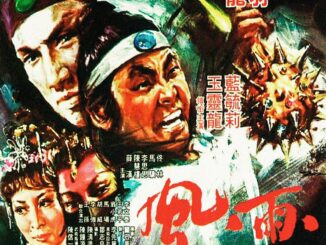
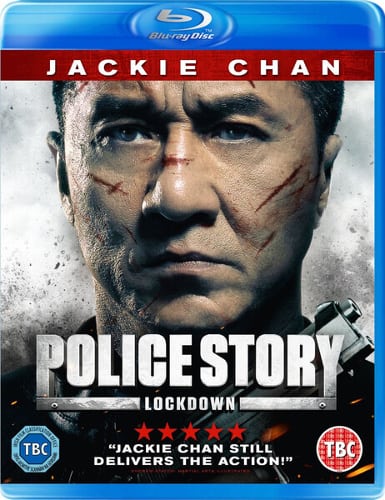
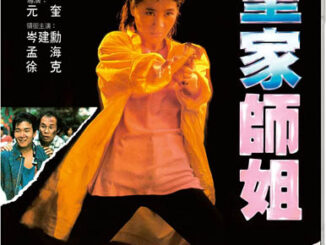
Be the first to comment